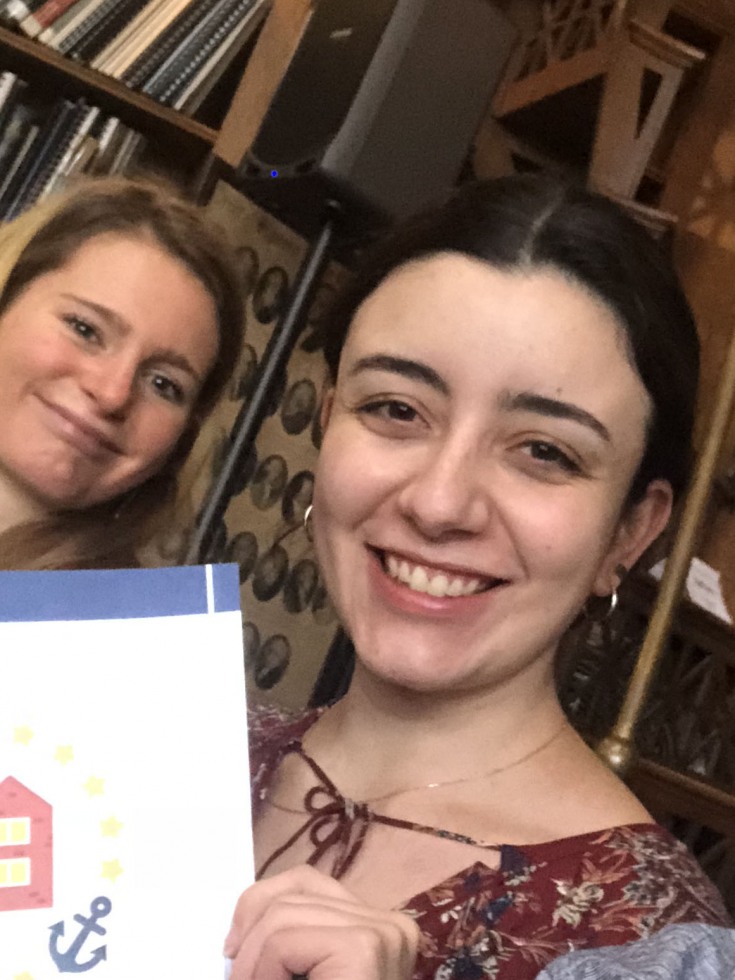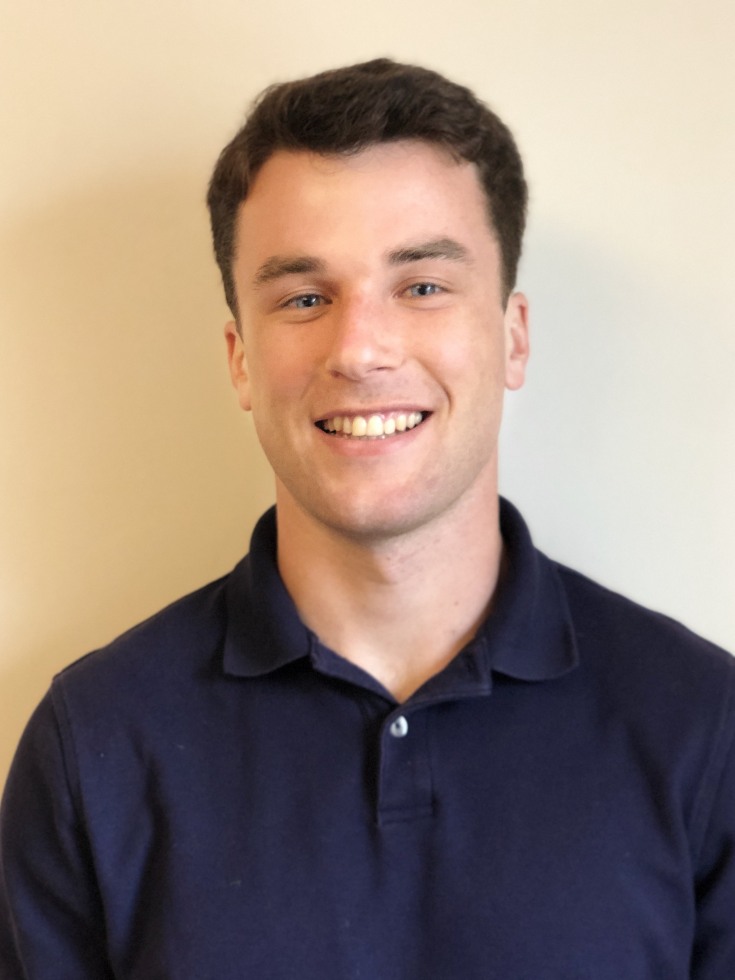This summer, members of HOPE at Brown, a student-run Swearer Center program that combats homelessness, are contributing to community-based research that identifies discrimination against housing-insecure individuals.
PROVIDENCE, R.I. [Brown University] - In 2012, Rhode Island became the first state to pass a Homeless Bill of Rights, which grants people experiencing homelessness the same rights, privileges and access to social services as those who are not. But personal and systematic discrimination against housing-insecure people persists, advocates say, making it difficult for individuals to access the services and resources to which they are entitled.
Housing Opportunities for People Everywhere - known as HOPE at Brown - is dedicated to changing this. A student-led organization run through the University's Swearer Center, HOPE at Brown includes more than 100 students who conduct outreach and collaborate with community partners on projects that support structural reforms aimed at ensuring equitable treatment for housing-insecure individuals.
This summer, HOPE at Brown students are working with the House of Hope Community Development Corporation- an organization dedicated to ending homelessness in Rhode Island - on remote research projects that students say have uncovered instances of systemic discrimination against housing-insecure individuals.
For rising Brown senior Annelise Ernst, the summer presented the opportunity to reimagine a research project that was already in progress. In the spring, the incoming HOPE at Brown co-director helped lead a team of approximately two dozen students in administering in-depth surveys to over 100 Rhode Islanders who either were or had recently experienced homelessness.
"The purpose of the survey was to be able to show with concrete numbers and personal testimony the many problems that service providers and outreach workers are aware of, but didn't have hard evidence to support," Ernst said.
As the summer began, Ernst's team had planned to present its findings in a comprehensive report, which they intended to deliver to nonprofits and government offices working on issues related to homelessness. But the groundswell of anti-racist activism that arose following George Floyd's killing by Minneapolis police changed the shape and purpose of the project.
"It just made all of us stop and say, 'Wait a second. How can we use this data to uplift this movement?'" Ernst said.
The group returned to their results, analyzing their data and open responses with a keener eye to race. In doing so, they found that Black respondents were more than twice as likely as white respondents to be charged with a crime related to their homelessness, such as loitering or congregating outside of an establishment.
They also saw that Black and Latinx respondents frequently noted in their open responses that their privacy had been violated by case managers, medical providers and government offices - an observation that did not arise at all among the open responses of white respondents.
The new findings shined a spotlight on the intersections between housing status and race, Ernst said - and have spurred the group to share their findings with a broader audience than they had originally intended.
"We're now considering ways to use this data to develop one-pagers and other resources for all community members on a number of themes, such as actions other than calling the police that they can take when a person experiencing homelessness needs help," Ernst said.
This moment of racial reckoning also caused HOPE at Brown to reexamine how its projects and philosophies account for the ways that race impacts homelessness, spurring the group to revise its mission statement and reconsider how it analyzes race in its research and policy work, Ernst said.
"We all believed that our anti-poverty and anti-homelessness work intersected with anti-racist work," she said. "But this moment has made us ask ourselves what it really means to reflect this intersectionality in our work - and see that there's no official endpoint to these conversations. We still have so much to learn."
We all believed that our anti-poverty and anti-homelessness work intersected with anti-racist work. But this moment has made us ask ourselves what it really means to reflect this intersectionality in our work - and see that there's no official endpoint to these conversations. We still have so much to learn.

Like Ernst, Caleb Weinstock was working directly with people experiencing housing insecurity before the pandemic hit Rhode Island. Each week, the rising junior joined a group of HOPE students providing fair housing information to clients of OpenDoors, a nonprofit that offers advocacy and resources that help residents with criminal records reintegrate into their communities.
Connecting formerly incarcerated individuals with fair public housing, however, proved a challenge.
"It was really, really hard because a lot of places are extremely discriminatory toward people with criminal records," Weinstock said. "We knew we needed to conduct research into how each development across the state treated criminal records in their application processes."
Just as Brown was shifting to remote learning this spring, Weinstock learned that House of HOPE was looking for HOPE at Brown students to evaluate local public housing applications for potential biases against applicants with criminal records. It was the perfect project for Weinstock to join - one that would provide his OpenDoors team members with the information they needed to better serve clients once in-person learning resumed.
"It was something I could do at home that really nicely connected the work I've been doing in-person," he said.
Since April, Weinstock has been helping to analyze these application forms for discriminatory questions.
"We try to figure out what kinds of applicants each development is rejecting and why," he said. "So we ask: What is the language they use when asking whether someone has a criminal history? Do they ask about convictions or arrests? Do they ask about drug and alcohol use?"
One goal of this analysis is to identify and report developments with explicitly discriminatory language. In many cases, however, developments indirectly solicit information that they cannot legally ask for, Weinstock said.
For example, while it is illegal to ask a public housing applicant if they have ever been arrested, a criminal background check - a common requirement that housing managers can legally seek - indicates arrests as well as convictions. This gives housing managers a way to discriminate on the basis of arrests without explicitly asking applicants for this information, he said.
By pinpointing ways that public housing applications enable discriminatory housing practices, the project will also help House of HOPE identify developments whose application processes are most amenable to housing people with criminal backgrounds - information that Weinstock intends to compile into a resource sheet that clients at OpenDoors can easily reference when seeking housing.
"I'm looking forward to using the information I found to help people," Weinstock said.
You learn about tons of stuff at school, but it's hard to put it all in perspective. HOPE at Brown really does that. Going to OpenDoors and talking with people about housing equality - it kind of makes that policy class that you had yesterday make a little bit more sense. It shows you that school is talking about something real.

The contributions that Weinstock, Ernst and their fellow HOPE at Brown members make to research and advocacy projects at House of Hope - and their investment in continuing this work remotely through the summer months - provides critical support to the organization.
"We couldn't do the work we do without these students," said Megan Smith, a member of House of Hope's outreach program who was herself a member of HOPE at Brown before graduating in 2010.
"Logistically, HOPE at Brown provides incredible bandwidth to our projects and is really, really good at matching student skill sets to community needs," Smith said. "And philosophically, HOPE at Brown has always been a groundswell of brilliant ideas and energy."
In addition to influencing individual projects, these student ideas promote the deep systemic change necessary to eradicate homelessness, Smith said.
"I've been doing this work now for 15 years," she said. "It's easy for the royal 'us' to become complacent with the status quo, and that's why we have a bad system that harms people. That's why I so deeply appreciate talking with the students about their vision and hearing their perspectives on these issues. It definitely makes me a better case manager and advocate."
The contributions that Ernst and Weinstock have made to community-based projects as members of HOPE at Brown have also enriched their own undergraduate experiences.
Ernst's academic path has been shaped by the research and advocacy projects undertaken in her three years with HOPE at Brown.
"My academic work has 100% been affected by my work with HOPE at Brown," said the sociology and urban studies concentrator. "Each year, I align my academic work more and more with my HOPE projects."
For example, during her junior year, Ernst participated in a Departmental Independent Study Project that enabled her to conduct research on housing discrimination based on source of income in Rhode Island. The research later informed the advocacy work of local community organizations.
"It was one of my most rewarding academic experiences at Brown because it so perfectly aligned with my work with HOPE at Brown," she said.
Weinstock, a political science concentrator, credits HOPE at Brown with giving him the opportunity to apply his coursework to solving a critical social problem.
"You learn about tons of stuff at school, but it's hard to put it all in perspective," he said. "HOPE at Brown really does that. Going to OpenDoors and talking with people about housing equality - it kind of makes that policy class that you had yesterday make a little bit more sense. It shows you that school is talking about something real."






